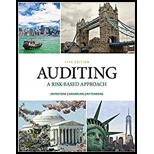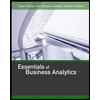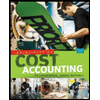
Bundle: Auditing: A Risk Based-approach, 11th + Mindtap Accounting, 1 Term (6 Months) Printed Access Card
11th Edition
ISBN: 9781337734455
Author: Karla M Johnstone-zehms, Audrey A. Gramling, Larry E. Rittenberg
Publisher: Cengage Learning
expand_more
expand_more
format_list_bulleted
Question
Chapter 8, Problem 25RQSC
To determine
Introduction:The MUS is the sampling method to evaluate the misstatements in account balances and
To evaluate: The three factors of the sample size in MUS.
Expert Solution & Answer
Want to see the full answer?
Check out a sample textbook solution
Students have asked these similar questions
Please provide the accurate answer to this general accounting problem using appropriate methods.
I am searching for the accurate solution to this general accounting problem with the right approach.
Calculate the division return on assets
Chapter 8 Solutions
Bundle: Auditing: A Risk Based-approach, 11th + Mindtap Accounting, 1 Term (6 Months) Printed Access Card
Ch. 8 - Prob. 1CYBKCh. 8 - Prob. 2CYBKCh. 8 - Prob. 3CYBKCh. 8 - Prob. 4CYBKCh. 8 - Prob. 5CYBKCh. 8 - Prob. 6CYBKCh. 8 - Prob. 7CYBKCh. 8 - Prob. 8CYBKCh. 8 - Prob. 9CYBKCh. 8 - Prob. 10CYBK
Ch. 8 - Prob. 11CYBKCh. 8 - Prob. 12CYBKCh. 8 - Prob. 13CYBKCh. 8 - Prob. 14CYBKCh. 8 - Prob. 15CYBKCh. 8 - Prob. 16CYBKCh. 8 - Prob. 17CYBKCh. 8 - Prob. 18CYBKCh. 8 - Refer to Exhibit 8.6. Assume a 5% risk of...Ch. 8 - Prob. 21CYBKCh. 8 - Prob. 22CYBKCh. 8 - Prob. 23CYBKCh. 8 - Prob. 24CYBKCh. 8 - Prob. 25CYBKCh. 8 - Prob. 26CYBKCh. 8 - Prob. 27CYBKCh. 8 - Prob. 28CYBKCh. 8 - Prob. 29CYBKCh. 8 - Prob. 30CYBKCh. 8 - Prob. 31CYBKCh. 8 - Prob. 32CYBKCh. 8 - Prob. 33CYBKCh. 8 - Prob. 34CYBKCh. 8 - Prob. 35CYBKCh. 8 - Prob. 36CYBKCh. 8 - Prob. 37CYBKCh. 8 - Prob. 38CYBKCh. 8 - Prob. 39CYBKCh. 8 - Prob. 1RQSCCh. 8 - Prob. 3RQSCCh. 8 - Prob. 4RQSCCh. 8 - Prob. 5RQSCCh. 8 - Prob. 6RQSCCh. 8 - Prob. 7RQSCCh. 8 - Prob. 8RQSCCh. 8 - Prob. 9RQSCCh. 8 - Prob. 10RQSCCh. 8 - Prob. 11RQSCCh. 8 - Prob. 12RQSCCh. 8 - Prob. 13RQSCCh. 8 - Prob. 14RQSCCh. 8 - Prob. 15RQSCCh. 8 - Prob. 16RQSCCh. 8 - Prob. 17RQSCCh. 8 - Prob. 18RQSCCh. 8 - Prob. 19RQSCCh. 8 - What is stratification? Distinguish between...Ch. 8 - Prob. 21RQSCCh. 8 - Prob. 22RQSCCh. 8 - Prob. 23RQSCCh. 8 - Prob. 24RQSCCh. 8 - Prob. 25RQSCCh. 8 - Prob. 26RQSCCh. 8 - Prob. 27RQSCCh. 8 - Prob. 28RQSCCh. 8 - Prob. 29RQSCCh. 8 - Prob. 30RQSCCh. 8 - Prob. 31RQSCCh. 8 - Prob. 32RQSCCh. 8 - Prob. 33RQSCCh. 8 - Prob. 36RQSCCh. 8 - Prob. 37RQSC
Knowledge Booster
Similar questions
- Please give me true answer this financial accounting questionarrow_forwardRaptors Inc. creates aluminum alloy parts for commercial aircraft. In a recent transaction Raptors leased a high precision lathe machine from Grizzlies Corp. on January 1, 2024. The following information pertains to the leased asset and the lease agreement: Cost of lathe to lessor $140,000 Grizzlies normal selling price for lathe 178,268 Useful life 7 years Estimated value at end of useful life 8,000 Lease provisions Lease term 5 years Payment frequency Annual Start date of lease January 1 Payment timing December 31 Estimated residual value at end of lease (unguaranteed) 20,000 Interest rate implicit in the lease (readily determinable by lessee) 7% Lessee's incremental borrowing rate 8% The lathe machine will revert back to the lessor at end of lease term, title does not transfer to lessee at any time, and there is not a bargain purchase option. Required…arrow_forwardFinancial Accountingarrow_forward
- Can you please solve this financial accounting problem without use Ai?arrow_forwardHobbiton Tours Ltd. has the following details related to its defined benefit pension plan as at December 31, 2024: Pension fund assets of $1,900,000 and actuarial obligation of $1,806,317. The actuarial obligation represents the present value of a single benefit payment of $3,200,000 that is due on December 31, 2030, discounted at an interest rate of 10%; i.e. $3,200,000 / 1.106 = $1,806,317. Funding during 2025 was $55,000. The actual value of pension fund assets at the end of 2025 was $2,171,000. As a result of the current services received from employees, the single payment due on December 31, 2030, had increased from $3,200,000 to $3,380,000. Required Compute the current service cost for 2025 and the amount of the accrued benefit obligation at December 31, 2025. Perform this computation for an interest rate of 8%. Derive the pension expense for 2025 under various assumptions about the expected return and discount rate. Complete the following table: Case…arrow_forwardCalculate Debt Ratios and Debt to Equity Ratio for 2016arrow_forward
- Please explain the correct approach for solving this financial accounting question.arrow_forwardIn 2026, Maple Leafs Co. sells its single machine, which cost $100,000 and has an undepreciated capital cost (UCC) of $25,000 for tax purposes. For financial reporting, the machine has carrying amount of $40,000. The sale price of the machine is $30,000. Aside from the sale of the machine, the company has other income (before taxes) of $600,000, which includes non-taxable dividends of $120,000 dollars received during the year. There are no other permanent or temporary differences. The company faces an income tax rate of 35%. Required Provide the journal entries for the company for 2026.arrow_forwardBlue Jays Corporation started operations on March 1, 2025. It needs to acquire a special piece of equipment for its manufacturing operations. It is evaluating two options as follows. Option 1: Lease the equipment for 5 years. Lease payments would be $11,000 per year, due at the beginning of each fiscal year (March 1). Blue Jays incremental borrowing rate is 5%. There is not a bargain purchase or renewal option. Blue Jays is responsible for all non-lease costs of operating the equipment. Option 2: Purchase the equipment for $50,000 by borrowing the full purchase amount at 5% over 5 years. This price is considered the fair value of the equipment. Payments are due at the end of each fiscal year (February 28). The equipment has a useful life of 5 years and would be depreciated on a straight-line basis. No residual value is expected to exist at the end of 5 years. Required Calculate the present value of the lease payments (Option 1). Calculate the payment that would be…arrow_forward
arrow_back_ios
SEE MORE QUESTIONS
arrow_forward_ios
Recommended textbooks for you
 Auditing: A Risk Based-Approach (MindTap Course L...AccountingISBN:9781337619455Author:Karla M Johnstone, Audrey A. Gramling, Larry E. RittenbergPublisher:Cengage Learning
Auditing: A Risk Based-Approach (MindTap Course L...AccountingISBN:9781337619455Author:Karla M Johnstone, Audrey A. Gramling, Larry E. RittenbergPublisher:Cengage Learning Essentials of Business Analytics (MindTap Course ...StatisticsISBN:9781305627734Author:Jeffrey D. Camm, James J. Cochran, Michael J. Fry, Jeffrey W. Ohlmann, David R. AndersonPublisher:Cengage Learning
Essentials of Business Analytics (MindTap Course ...StatisticsISBN:9781305627734Author:Jeffrey D. Camm, James J. Cochran, Michael J. Fry, Jeffrey W. Ohlmann, David R. AndersonPublisher:Cengage Learning Principles of Cost AccountingAccountingISBN:9781305087408Author:Edward J. Vanderbeck, Maria R. MitchellPublisher:Cengage Learning
Principles of Cost AccountingAccountingISBN:9781305087408Author:Edward J. Vanderbeck, Maria R. MitchellPublisher:Cengage Learning Managerial Accounting: The Cornerstone of Busines...AccountingISBN:9781337115773Author:Maryanne M. Mowen, Don R. Hansen, Dan L. HeitgerPublisher:Cengage Learning
Managerial Accounting: The Cornerstone of Busines...AccountingISBN:9781337115773Author:Maryanne M. Mowen, Don R. Hansen, Dan L. HeitgerPublisher:Cengage Learning

Auditing: A Risk Based-Approach (MindTap Course L...
Accounting
ISBN:9781337619455
Author:Karla M Johnstone, Audrey A. Gramling, Larry E. Rittenberg
Publisher:Cengage Learning

Essentials of Business Analytics (MindTap Course ...
Statistics
ISBN:9781305627734
Author:Jeffrey D. Camm, James J. Cochran, Michael J. Fry, Jeffrey W. Ohlmann, David R. Anderson
Publisher:Cengage Learning

Principles of Cost Accounting
Accounting
ISBN:9781305087408
Author:Edward J. Vanderbeck, Maria R. Mitchell
Publisher:Cengage Learning

Managerial Accounting: The Cornerstone of Busines...
Accounting
ISBN:9781337115773
Author:Maryanne M. Mowen, Don R. Hansen, Dan L. Heitger
Publisher:Cengage Learning